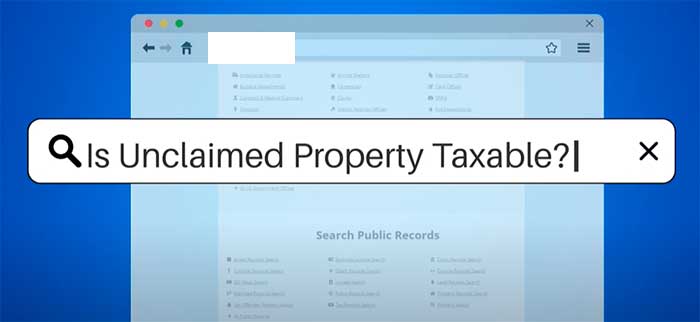
Information About Unclaimed Property
Unclaimed property includes financial assets that have been abandoned by their owners for a period of time. These assets can range from:
- Bank accounts and savings deposits
- Stocks, bonds, and mutual funds
- Insurance payouts
- Uncashed checks (such as payroll or dividend checks)
- Contents of safe deposit boxes
Each state holds these assets until the rightful owner comes forward to claim them.
Are Unclaimed Property Proceeds Taxable?
Yes, the proceeds from unclaimed property can be taxable under certain circumstances. Here’s how different types of unclaimed property might be treated for tax purposes:
- Interest and Dividends: If you reclaim bank accounts or securities that have accrued interest or dividends, this income is generally taxable. You should report this on your federal tax return.
- Capital Gains: If the unclaimed property includes stocks or bonds that have appreciated in value, selling these assets might result in capital gains, which are subject to capital gains tax.
- Cash Payments: Lump-sum cash payments from reclaimed assets are typically subject to income tax.
- Tax Refunds: If your unclaimed property includes a tax refund, you should consult a tax professional to understand how to report it correctly, as it might not be taxable again.
For information on whether you will receive a 1099 form for unclaimed property, read our article Will I Get a 1099 for Unclaimed Property?.
Reporting Unclaimed Property on Your Taxes
When you receive unclaimed property, you must report it on your tax return in the appropriate sections. Here’s a general guideline on how to handle different types of unclaimed property:
- Interest Income: Report as interest income on Schedule B of your federal tax return.
- Dividends: Report dividend income on your tax return, typically using Form 1099-DIV provided by the entity that issued the dividend.
- Capital Gains: Calculate and report capital gains or losses on Schedule D, taking into account the cost basis of the assets.
- Other Income: Report other types of unclaimed property as other income on your tax return, ensuring you keep documentation for accuracy.
Always consult with a tax professional to ensure you’re complying with all tax laws and reporting requirements correctly.
State Tax Implications
In addition to federal taxes, you may also be subject to state taxes on unclaimed property. The tax treatment can vary based on your state of residence. Key points to consider include:
- State Income Tax: Some states may require you to include unclaimed property proceeds as part of your state taxable income.
- State-Specific Rules: Each state may have unique reporting requirements and tax treatments for different types of unclaimed property.
Check with your state’s tax authority or a local tax professional for specific guidance related to your situation.
How to Prepare for Tax Filing
To ensure you’re prepared for tax filing after reclaiming unclaimed property, follow these steps:
- Keep Documentation: Maintain records of the unclaimed property, including the original claim documents and any correspondence received from the state.
- Track Income: Record any income earned from unclaimed property, such as interest or dividends, throughout the year.
- Consult a Tax Professional: Work with a tax professional to understand the implications and ensure accurate reporting on your tax return.
- Review State Guidelines: Review any state-specific guidelines to comply with local tax laws and reporting requirements.
Consulting a Tax Professional
Given the complexities of tax laws, it is highly recommended to consult with a tax professional when dealing with unclaimed property. They can provide tailored advice based on your financial situation and ensure you meet all federal and state tax obligations correctly.
